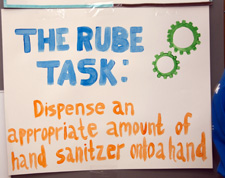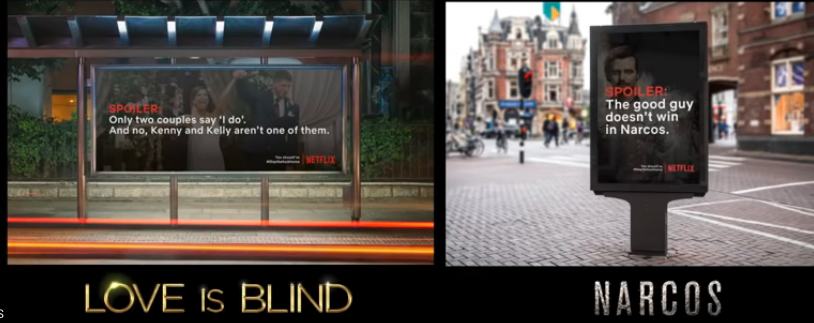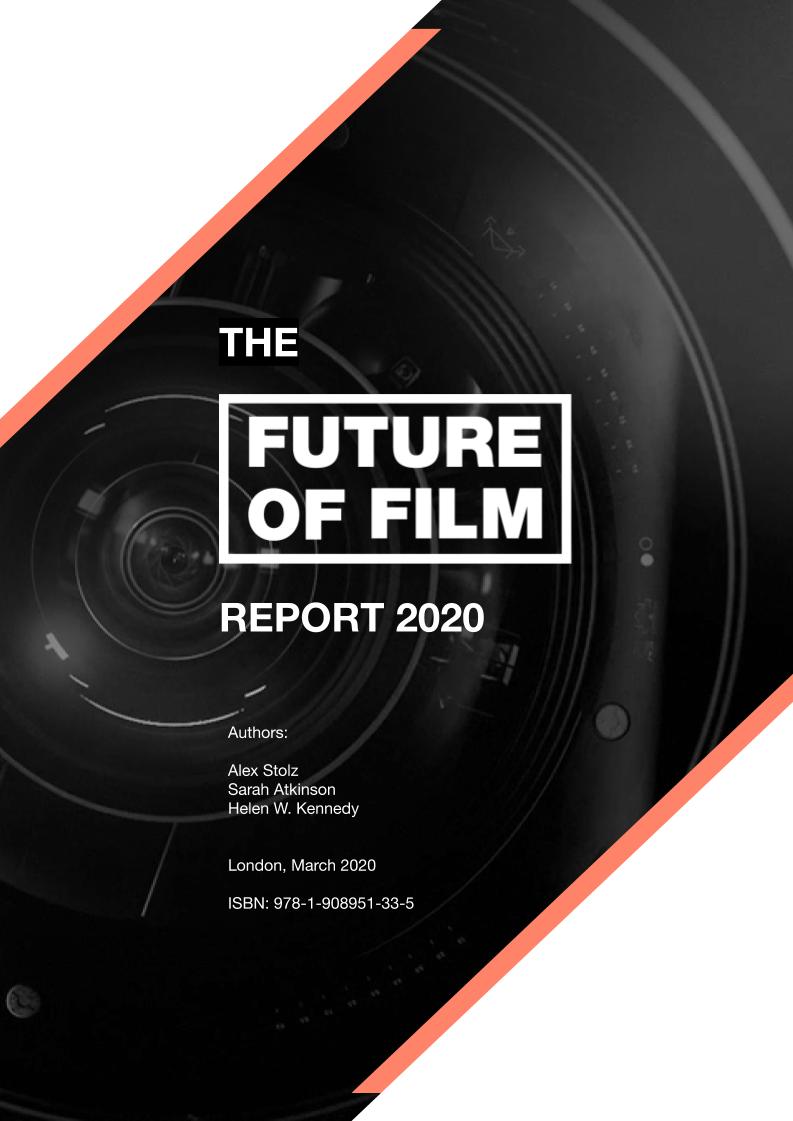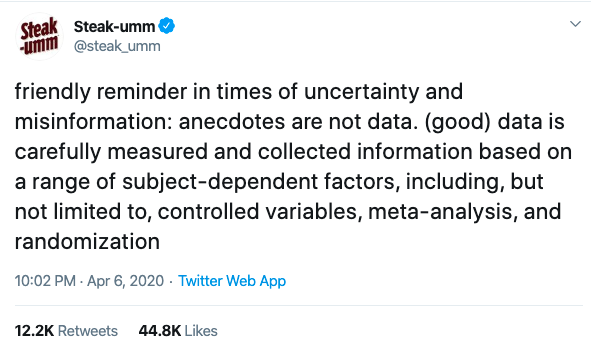
Last week, I looked at all of the ways I think the film industry is going to be impacted by this crisis, and how we won’t be going back to normal. I promised a Part Two that would be more positive, but remember that I did post positive thoughts just a week earlier. If you are looking for a list of clear solutions, quit reading now. I don’t have them, and I don’t think anyone else does, either. Instead, here’s some thoughts on how we should approach this new reality – a mindset we might bring to the situation – in the form of some slogans we would do well to remember. These are mainly written towards arthouse/indie filmmakers, but I think they apply to branded content folks (my other audience) as well.
| It’s not til the Tide Goes Out that You See Who’s Swimming Naked Often attributed to Warren Buffet, I think this slogan applies pretty well to the film business right now (all business?). While a lot of the damage from the crisis is unique – so many people losing jobs at once, no one can gather or work together, etc. – there’s also a fair amount of things that always sucked about the film business, but this crisis just laid them bare, to where we can’t deny their reality any longer. Guess what? Festivals – other than the top 5-6 – never helped sell films. As Marj Safinia said in a group conference call I was on recently – that was a false security blanket that has now been removed. The indie film world, and docs in particular, were never a sustainable career-path. Arthouse distribution and exhibition was always a shitty business. A lot of this was a house of cards. It sucks to have a band-aid ripped off fast, but the pain ends quicker. I know this sounds pessimistic, but it’s not – now that we’ve been forced to collectively realize that few of us have our pants on below those Zoom screens, we can also start to build something based less on fiction and more on the reality we now know we live in. |
Invent the Future
This has been the slogan of most of my keynotes since 2009 – following the advice of Alan Kay, who said – the best way to predict the future is to invent it (some credit Dennis Gabor). The idea remains the same – predictions about the future are notoriously tricky, but smart folks shouldn’t wait around to see what happens. As I said last week, we’re not going back to normal, but since no one knows what the new normal is going to look like, we should invent (and build) the one we want. And that’s one of the sole things that gives me comfort when thinking about the future – a bunch of folks are probably inventing it right now. They might not even know it yet. But sure enough, a few years from now we’ll have entire new systems – a new reality – that was built out of this crisis.
Build Your Plan-A – Everything else is Plan B
When indie filmmakers try to build a plan for their films, I’ve always given the same advice, but I think it applies to all of us now. Build a Plan A that encompasses what you can do for your film on your own. If you don’t get into Sundance, and don’t get bought by A24 or Netflix, how would you release your film to audiences given your resources – both time and money – what’s the best you could do?
That is your Plan A, and you plan for it as if that is what’s going to happen. Then, if you get lucky and a distributor does want to buy your film, that offer is a Plan B. Plan B might be better than Plan A – in the best case, it should be better than what you could do on your own. But now you have something to compare their offer to, your Plan A, and that gives you a way to figure out just how good that offer is, because you now have a baseline from which to judge. Maybe they aren’t offering something you would do, or you could do better, well, now you can negotiate because you have a Plan A. But if you don’t have a Plan A, then someone else’s Plan B is the only option you’re going to have, because you never made a plan. While this was advice for filmmaker’s thinking about distribution of their films, I think it applies to how we should plan for much about creative-life, post-covid-19.
Collaboration is Key
If there’s one thing this virus should have taught us by now, it’s the importance of collaboration. We’ve seen the bad shit that happens from lack of it as well. We can all point to numerous examples of good things we’ve seen recently that only came about because of collaboration. But while filmmaking itself is a collaborative, team effort, I’ve always found the film community (non-documentary, mainly) to be the least collaborative group I know when it comes to everything except production. I think we’ll need to change this going forward. Here’s just a few examples where I think collaboration would work great:
A. Filmmakers – so many filmmakers were simultaneously hit with the same problems – cancelled festival premieres, and trying to figure out how to get the attention of buyers and/or audiences with their films. Instead of going it alone, why not band together? Instead of waiting for Festival-X to re-schedule, or Sales Agent-Y to pitch Buyer-Z, why not band together with several others who are stuck in the same boat and bring your films to audiences, together. Why not offer a “festival” of films that were in Spring Festivals as a package? Instead of relying on curators from those festivals, why not curate yourselves? I’d gladly pay $50 for 5 new science fiction films on Vimeo, and if you band together, you might have the mailing lists and resources to reach me. When we can gather again, why not a tour that you curate? This can play out multiple ways, but you get my drift.
B. Film Festivals – There’s a lot of room for more collaboration between film festivals, and I don’t mean just by joining an alliance. We’ll have to see what this means in practice, but the recently announced Toronto Film Fest initiative to go back to its roots as a “festival of festivals” is a great idea. Let’s take it a step further. Since 90% of the film festivals out there program the same films anyway, why do we need separate organizations in each town? The few festivals that are brands would do well to think about some version of M&A expansion. Others should collaborate to make more efficient tours of films and shared resources. Why launch thousands of small online fests that few people log into, when we could make one bigger one with an SVOD platform? All of these ideas existed before, but now is the time to implement them.
C. Theaters – Your job is not popping popcorn, but bringing cinema to your local audience – which most theater owners already know. People who like cinema will show back up later, but in the meantime, why give away those audiences (via their email addresses) to others who want to reach them? Band together, via AHC or EuropaCinemas or both, and build your own OTT platform (not individually, but together for scale) and you own the audience and share the revenue with distributors instead of vice-versa. Shift72 is powering many similar ideas, and they would be a good place to start.
D. Branded Content – so many brands make films about their work on climate change, or empowering women, or other important social issues. But if they really want to have an impact on any of these issues – and aren’t just virtue signaling – why not band together to have a greater impact? A series of films, podcasts, articles and yes, even ads, from multiple brands, simultaneously, would have much greater impact than that of any brand’s content “going it alone.”
E. Audience Building – Kevin Kelly was right when he said (in 2008) that all you really need is 1000 true fans. Filmmakers are not marketers. That’s been a hard lesson for the field over the years, but I’m going to try one more time – there’s never been a better time to build your fan/audience base. Everyone is stuck at home, scrolling through social media, and many of us have some spare time. Now is the time to focus on building your fan base for you as an artist, and for your (upcoming?) film. And you’re going to need that connection, because guess what – the world is going to have less of what we relied on for audience-building and marketing before – less: film festivals (and their curators), distributors, theaters, print publications, broadcasters, paid critics – there’s a long list of disappeared parts of the system. What will remain? Social media and your direct connection to that audience. But only if you build it, participate with it and nurture it. There’s also a big role here for collaboration amongst the other players mentioned above – theaters, festivals, distributors, and brands. While I argued above that theaters shouldn’t just give away their emails, I would advocate for everyone to join together to build a system, with varying levels of permissions and opt-ins, that would allow me as a consumer to subscribe to updates from multiple artists, distributors, theaters, brands, etc. I don’t want to just hear from Film Forum. I want to know when Tom Putnam releases Dark Divide, no matter where it’s playing, and I want to subscribe to him, just once and get future updates too. I’d be happy for all of you to be able to notify me – when it comes to FilmLinc, or when it comes to Netflix, or when it’s at your festival (but only when I’m visiting your town). Let’s build this system together. Festivals, theaters and brands should be curating selections for me, but not just of what they’re playing or funding. If I trust you, give me a reason to interact year round.
F. Advocacy – nonprofit service organizations should be merging together, or at least joining forces, and should start doing real advocacy, which means lobbying and other moves to build a better system for our future. The recent IDA/ITVS/Firelight seminars were incredible, but just a start towards what we need to see more often. Last year, I wrote a popular post about the need for a new AIVF – and we still need it. As I wrote then: “Yes, we have great organizations that might take up the cause – IFP, Sundance, Impact Partners, IDA, Kartemquin and many great festivals (if I didn’t mention your favorite org, it’s unintentional) – but solving the problems around building a better ecosystem for independent media artists is bigger than any one of their missions and if they haven’t found the time to do it on their own since 2006, it’s not going to happen now (but they’ll collaborate on the answer). We need a new AIVF, but for the modern era. I’m not sure what it should look like, but I know we need it, or something like it. I imagine it’s more of a with-profit than a nonprofit, meaning some hybrid of nonprofit activism and services, coupled with some for-profit, entrepreneurial activities.” Let’s get that started, finally.These are just a few, pretty easy to say and hard to execute ideas – I know- but we have to start inventing somewhere, and I’m convinced that these ideas will be key to our success.
| Stuff I’m Reading: Film Emergency Grants for Filmmakers & Others – I imagine most of my readers have heard about these, but just in case – POV, the great PBS doc series, has launched an emergency fund for artists/filmmakers. Info and application forms are here. And Field of Vision/TOPIC have launched a fund for documentary freelancers, including producers, editors, assistants – anyone in the field it seems, which is great! Apply here. Last, The Opportunity Agenda and PopCollab offer $1K emergency grants for Social Impact artists and cultural strategists – apply here.  Netflix Makes “Spoiler” Billboards to Keep People Inside – brilliant ad campaign here. While the actual “social impact” of distancing is obviously minor here, it’s a great idea. WeAreSocialMedia reports. Need to apply for Coronavirus Relief as a Filmmaker? The IDA, ITVS and Firelight teamed up to bring together this super-helpful workshop on how to apply for the CARES/PPP relief program– whether you are a freelancer or small business. Honestly, this was probably the single best educational program or Zoom meeting I’ve attended since the lockdown began. The video is worth watching and the link has many other helpful resources – I think I used all of them.  The Future of Film Report is live – Future of Film’s Alex Stolz launched his FOF Report recently, and it’s a great read. I particularly like that he and his contributors focused primarily on how technology will change production and development, and most of it is very positive and interesting for anyone thinking about the future of film. It’s time to learn online marketing based on behavioral data – While this was written BC (before-covid), it’s very timely now that we all need to learn how to market titles online smartly, using data. Anthony Kaufman reports on some success stories, and how to get started for Filmmaker Magazine. One good example, from Jim Cummings of Thunder Road – “The big takeaway for Cummings was the realization that he could connect with potential audiences and bypass traditional forms of gatekeeping. “Let’s say you’re having a hard time getting a Variety review. Now, you can just target people on Facebook who like Variety, and it’s the equivalent of getting press in Variety,” he explains. “By spending money on this or that platform, you’re able to hijack an outlet that wouldn’t let you have access without them having anything to do with it.” Cornavirus, Streaming and Piracy – I was interviewed in this nice little article from Aric Jenkins in Fortune back in late March (feels like a decade ago, right) about how the virus might impact streaming and piracy. I’m less worried about piracy long term (I see it as a failure in the business model), but do think behavior has changed, ever more quickly, and people want what they want, when they want it, on what device, yesterday. |
Stuff I’m Reading: Branded Content Steak-Umm is Leading Brand Messaging around Covid-19 – This isn’t branded content, per se, but Steak-Umm has been doing an awesome job with its social media account (it’s actually a person named Nathan Allebach according to FastCo). If Steak-Umm can find a way to make relevant, smart and informed content during this virus, you have no excuse not to do the same, BrandX (insert your name here). Hell, this is better than most nonprofits I follow. Brand-Purpose Storytelling Post-Covid: I participated in an online panel/Zoom about purpose-driven storytelling by brands – how to do it, and how to do it now – that was organized by Brand Storytelling. The video will reside here when they post it soon. This is one of a series of talks they are hosting, and it’s a great resource for brands, brand story-tellers, and just about anyone in the media space. I recommend listening to the discussions, and you can get the schedule and register (for free) here. Budweiser is “not in advertising mode” says Anheuser-Busch InBev US CMO Marcel Marcondes to DigiDay – more than once – saying they are putting money into services and other areas. Like a lot of brands, I suspect. They did run this ad for their program to shift sports support to Red Cross support. |
| Stuff I’m Reading: Miscellany The Internet Archive made more books available for free, and people freaked out – A few folks, including Vox and Redef, picked up the BS-laden Author’s Guild version of this story, so do yourself a favor and read the Mike Masnick “real news” version of the same. Basically, the Internet Archive has made digital copies of books – in a completely legal manner – and then made them available for free, with DRM – for lending – just like a library does. Publishers and the Author’s Guild freaked out -but don’t assume they are in the right here, as if they had their way, regular libraries wouldn’t exist either. Oh wait, they barely do right now, and that’s why this National Emergency Library is both a great thing, and legal. Video Gaming, Live Streaming and E-Sports viewing is off the charts – this was to be expected, but Techcrunch reports video game usage spiked 75%; while Endgadget reports that Twitch viewing was up 23% to just over 1.2 Billion hrs. That’s a lot of usage competing with movies and everything else! Oh, and while we don’t have sports to compete with, we do have E-Sports, which ESPN added, showing over 12 hrs on April 5th alone. (H/T to Unsupervised Learning for the links). Ignore the Pressure to be Productive- Says Aisha Ahmad in the Chronicle of Higher Education (h/t Leah Warshawski) – Lots of variations on this sentiment have run lately, but I like this one the most. From the article: “Understand that this is a marathon. If you sprint at the beginning, you will vomit on your shoes by the end of the month. Emotionally prepare for this crisis to continue for 12 to 18 months, followed by a slow recovery. If it ends sooner, be pleasantly surprised. Right now, work toward establishing your serenity, productivity, and wellness under sustained disaster conditions.” The Obie Awards moved online (like everyone) and is donating the savings to artists (like everyone should) – The NYT reports on what should become standard practice for everyone moving their events online. |

Trackbacks/Pingbacks